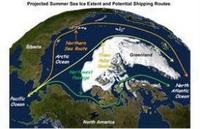-
2012 economic losses from disasters set new record at $138 billion
The UN Office for Disaster Risk Reduction (UNISDR) reported that for the first time in history, the world has experienced three consecutive years in which annual economic losses have exceeded $100 billion. The losses are the result of an enormous increase in exposure of industrial assets and private property to extreme disaster events.
-
-
Urgent need to find asteroids that threaten Earth: expert
The impact from a 100-meter long asteroid hitting Earth would be equal to detonating a 100-megaton hydrogen bomb. Several large asteroids have zipped dangerously close to Earth in the past month. There are millions of these near-Earth-orbit (NEOs) asteroids longer than 100 meters. Because they are relatively small, and because they spend so much time far from Earth, scientists tend to find them only by chance.
-
-
Russia embarking on a program to thwart asteroid threat
Officials from Rosatom, Russia’s nuclear agency, and from Russia’s space agency, yesterday (Tuesday) told a special conference at the Russian Federation Council, the Russian upper house, that Russia was embarking on an ambitious program – estimated to cost about $2 billion – to shield Russia from the threat of asteroids and meteors. The first steps will be taken by the end of the year, but the comprehensive set of measures will not be available until 2018-20. The officials discussed various possible measures, ranging from planting beacon transmitters on asteroids to megaton-sized nuclear strikes to destroy asteroid or divert them from a course which would lead to a collision with the Earth.
-
-
New radioactive waste repackaging facility in Los Alamos
The Los Alamos National Laboratory has brought a third waste repackaging facility online to increase its capability to process nuclear waste for permanent disposal. The box line facility is largest of its kind ever built.
-
-
Making future sea-level predictions more accurate
Sea-level rise is a major issue facing those in charge of infrastructure protection in coastal communities. New research into radiocarbon dates of tiny fossilized marine animals found in Antarctica’s seabed sediments offers new clues about the recent rapid ice loss from the West Antarctic Ice Sheet and helps scientists make better predictions about future sea-level rise.
-
-
Grid-scale batteries for storing renewable energy have large carbon footprint
Most of the electricity produced in the United States comes from coal- and natural gas-fired power plants. Only about 3 percent is generated from wind, solar, hydroelectric, and other renewable sources. A key problem is that the U.S. electrical grid has virtually no storage capacity, so grid operators cannot stockpile surplus clean energy and deliver it at night, or when the wind is not blowing. Stanford scientists have developed a novel way to calculate the energetic cost of building large batteries and other storage technologies for the electrical grid. The found that the fossil fuel required to build these technologies could negate some of the environmental benefits of installing new solar and wind farms.
-
-
Coal and U.S electric power generation

Coal is an important fuel source in the United States today. Responsible for approximately 39 percent of the country’s electrical generation, coal is vital to the day-to-day operation of people’s lives. The United States is rich in coal deposits, with large resources. One of the most important and largest of those deposits is found in the Powder River Basin (PRB) of Wyoming and Montana, which, in 2012, produced more than 42 percent of the nation’s coal.
-
-
Arctic ice loss intensified Superstorm Sandy ferocity
If you believe that last October’s Superstorm Sandy was a freak of nature — the confluence of unusual meteorological, atmospheric and celestial events – then Cornell and Rutgers researchers suggest you should think again. The researchers report that the severe loss of summertime Arctic sea ice — attributed to greenhouse warming — appears to enhance Northern Hemisphere jet stream meandering, intensify Arctic air mass invasions toward middle latitudes, and increase the frequency of atmospheric blocking events like the one that steered Hurricane Sandy west into the densely populated New York City area.
-
-
World’s first zero emission sports car is built-at-home electric car

A new partnership has developed the world’s first build at home electric race car kit, an all-electric sports car designed and engineered to support a growing demand for zero emission racing vehicles. The iRacer kit, available from £13,999, can be transformed quickly between hybrid, pure electric, or internal combustion engines.
-
-
Global warming opening new shipping routes in Arctic Ocean

The Arctic Ocean has captured the imagination of explorers because of the possibility it offers for traveling between the Pacific and the Atlantic oceans through the Bering Strait. Until recently, however, sea ice has blocked access to the potential shortcut between Asia and North America or Europe. In the past two years, the ice has begun to melt in late summer to such an extent that even ordinary seagoing vessels have been able to enter its frigid waters. For vessels traveling between Rotterdam in the Netherlands and Yokohama, Japan, the Northern Sea Route is approximately 40 percent shorter than the traditional route through the Suez Canal.
-
-
Arsenic in groundwater in Bangladesh naturally occurring
Human activities are not the primary cause of arsenic found in groundwater in Bangladesh. Instead, a team of researchers found that the arsenic in groundwater in the region is part of a natural process that predates any recent human activity, such as intensive pumping.
-
-
Norfolk, Virginia, tries to cope with sea-level rise
Norfolk, Virginia, is home to the largest U.S. naval base in the country, and the second biggest commercial port on the U.S. Atlantic coast. Floods are an ever-present problem, a problem which has become worse in recent decades. The relative sea level around Norfolk has risen 14.5 inches (.37 meter) since 1930, when the low-lying downtown area routinely flooded. The frequency of storms-induced surges has increased as well.
-
-
The impact of sea-level rise on coastal military installations
The Pentagon says that climate-related effects are already being observed at Department of Defense (DoD) installations in every region of the United States and its coastal waters. The effects of climate change will adversely impact military readiness and DoD natural and built infrastructure unless these risks are considered in DoD decisions. A new white paper developed by the Pentagon’s Strategic Environmental Research and Development Program (SERDP) identifies key climate-related policy questions that need to be addressed.
-
-
Volcanic aerosols, not pollutants, slowed recent Earth warming
Researchers looking for clues about why Earth did not warm as much as scientists expected between 2000 and 2010 now thinks the culprits are hiding in plain sight — dozens of volcanoes spewing sulfur dioxide.
-
-
No gloom-and-doom: science does not back global tipping point view
A group of international ecological scientists have rejected a doomsday-like scenario of sudden, irreversible change to the Earth’s ecology. The scientists argue that global-scale ecological tipping points are unlikely and that ecological change over large areas seem to follow a more gradual, smooth pattern.
-
- All
- Regional
- Water
- Biometrics
- Borders/Immig
- Business
- Cybersecurity
- Detection
- Disasters
- Government
- Infrastructure
- International
- Public health
- Public Safety
- Communication interoperabillity
- Emergency services
- Emergency medical services
- Fire
- First response
- IEDs
- Law Enforcement
- Law Enforcement Technology
- Military technology
- Nonlethal weapons
- Nuclear weapons
- Personal protection equipment
- Police
- Notification /alert systems
- Situational awareness
- Weapons systems
- Sci-Tech
- Sector Reports
- Surveillance
- Transportation
Advertising & Marketing: advertise@newswirepubs.com
Editorial: editor@newswirepubs.com
General: info@newswirepubs.com
2010-2011 © News Wire Publications, LLC News Wire Publications, LLC
220 Old Country Road | Suite 200 | Mineola | New York | 11501
Permissions and Policies
Editorial: editor@newswirepubs.com
General: info@newswirepubs.com
2010-2011 © News Wire Publications, LLC News Wire Publications, LLC
220 Old Country Road | Suite 200 | Mineola | New York | 11501
Permissions and Policies
